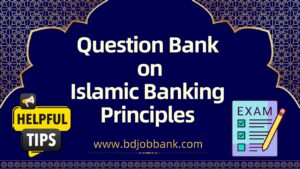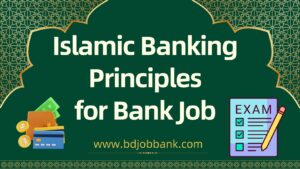Islamic Banking Contracts and Modes of Finance for Bank Job Preparation
Islamic Banking Contracts and Modes of Finance for Bank Job Preparation in Bangladesh and Worldwide
Islamic Banking Contracts and Modes of Finance
Islamic banking follows Shariah (Islamic law), which prohibits interest (riba) and ensures ethical financial transactions. Instead of earning money through interest like conventional banks, Islamic banks use specific contracts and agreements that comply with Islamic principles. These contracts focus on fairness, risk-sharing, and asset-backed financing. If you are preparing for a bank job in Bangladesh, understanding these Islamic banking modes is essential.
What is Islamic Banking?
Islamic banking is a financial system that operates according to Islamic law. It avoids interest-based transactions and speculative activities. Instead, it promotes ethical investments and risk-sharing principles. The main goals of Islamic banking include:
- Promoting fairness in financial transactions.
- Avoiding exploitative practices.
- Ensuring that money is linked to real economic activity.
- Supporting socially responsible investments.
To achieve these goals, Islamic banks use special contracts. Below are some of the most common and important Islamic banking contracts and modes of finance.
1. Murabaha (Cost-Plus Financing)
Murabaha is a financing method where the bank purchases an asset and sells it to a customer at a marked-up price. The customer pays for the asset in installments or as a lump sum. Unlike conventional loans, there is no interest involved—just a profit margin that is clearly disclosed. Key features of Murabaha include:
- Transparency: The bank informs the customer of the original price and the profit margin.
- No Hidden Charges: The terms are agreed upon before the transaction.
- Asset-Based: The deal must involve a tangible asset, like a car or machinery.
Example of Murabaha
A businessman wants to buy raw materials but lacks the funds. Instead of giving him a loan, the Islamic bank buys the raw materials and sells them to him at a higher price, allowing him to pay over time.
2. Mudaraba (Profit-Sharing Partnership)
Mudaraba is a partnership where one party (the bank or an investor) provides capital, and the other (the entrepreneur) manages the business. Profits are shared based on an agreed ratio, but if the business incurs losses, only the investor loses money—unless the entrepreneur was negligent.
Key aspects of Mudaraba:
- Encourages Entrepreneurship: Entrepreneurs can access funds without taking loans.
- Profit Sharing: Profits are divided according to a pre-agreed ratio.
- Loss Responsibility: The investor bears financial losses unless mismanagement occurs.
Example of Mudaraba
A skilled tailor has the expertise to run a clothing business but lacks capital. An Islamic bank provides funding, and they agree to share profits 60:40. If the business makes money, the bank gets 60% and the tailor 40%. If it fails, the bank bears the financial loss.
3. Musharakah (Joint Venture Investment)
Musharakah is a joint partnership where both the bank and the client contribute capital. Profits and losses are shared in proportion to each partner’s investment. This mode of finance is used for large-scale projects, such as construction or manufacturing businesses.
Key features of Musharakah:
- Shared Risk and Reward: Profits and losses are divided based on capital contribution.
- Active Participation: Both parties may have a say in management.
- Flexible Structure: The agreement can be tailored to different business needs.
Example of Musharakah
A real estate developer and an Islamic bank invest in building an apartment complex. The bank provides 70% of the funds, and the developer provides 30%. Profits from selling apartments are split based on the same ratio.
4. Ijarah (Islamic Leasing)
Ijarah is an Islamic lease agreement where the bank buys an asset (like a house or car) and rents it to a customer for a fixed period. The bank remains the owner while the customer pays rental fees.
Key features of Ijarah:
- No Interest Payments: Rent is paid instead of loan installments.
- Ownership Stays with the Bank: The bank retains ownership throughout the lease period.
- Option for Ownership Transfer: Some agreements allow the customer to buy the asset at the end of the lease.
Example of Ijarah
A person wants a car but cannot afford to buy it outright. The Islamic bank buys the car and leases it to him. He pays rent every month. At the end of the lease, he may have the option to buy the car.
5. Takaful (Islamic Insurance)
Takaful is an Islamic insurance system based on mutual assistance and shared responsibility. Instead of conventional insurance, which involves uncertainty (gharar) and gambling (maysir), Takaful works as a cooperative fund. Participants contribute money to cover potential risks.
Key aspects of Takaful:
- Risk Sharing: Members pool their money to help those in need.
- Ethical Investments: Funds are invested in Shariah-compliant businesses.
- No Fixed Premiums: Contributions are based on cooperative principles.
Example of Takaful
A group of farmers contributes to a Takaful fund. If one farmer faces a natural disaster and loses his crops, he gets financial support from the collective pool.
Why Islamic Banking Matters for Bank Job Preparation?
Islamic banking is growing rapidly in Bangladesh. Many banks, including Islami Bank Bangladesh Limited (IBBL) and other conventional banks, now offer Islamic banking services. Job seekers in the banking sector must understand these concepts to increase their chances of securing a position.
Key Takeaways for Job Preparation:
- Learn the principles of Islamic banking and how they differ from conventional banking.
- Understand the main financing contracts: Murabaha, Mudaraba, Musharakah, Ijarah, and Takaful.
- Be familiar with real-life applications of these contracts.
- Keep updated on the latest trends in Islamic finance.
Islamic banking provides ethical and interest-free financial solutions. It follows a system based on fairness, transparency, and real economic transactions. As Bangladesh continues to develop its Islamic finance sector, job seekers must familiarize themselves with these key concepts. By mastering Islamic banking contracts, you can improve your job prospects and contribute to a growing industry.

